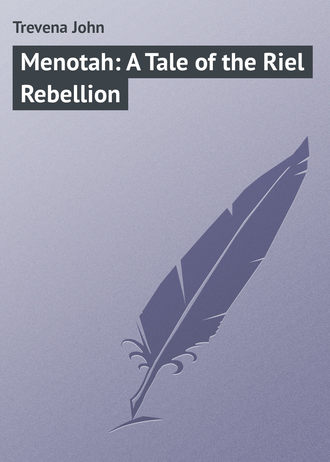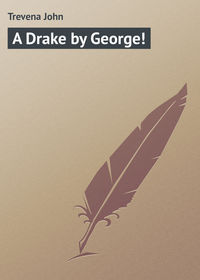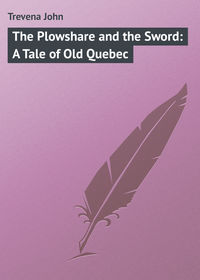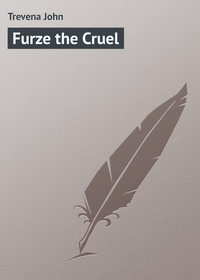 полная версия
полная версияMenotah: A Tale of the Riel Rebellion
The old man slowly turned himself from the glowing face of the setting sun, and raised his wrinkled countenance heavily towards the powerful features of the young warrior. His cheeks were thickly painted with a lurid stain of carmine; the effect of the unnatural colour upon the dried up flesh was ghastly to an extreme. His form was doubled together almost by infirmity and time, for the weight of over four score years was pressing him down to the grave.
He extended and spread an almost fleshless hand upon the warm flesh of the other's rounded arm.
'You have finished all preparations, Muskwah? The young men are now ready, and each has weapons for the fight?'
'All that I can accomplish as leader of your children has been done, Father.'
The old man was chief of the tribe and therefore regarded as the titular father of all.
'But the warriors understand their duties Muskwah? I would have no sad scene of women lamenting in the encampment. I would not listen to the low chanting of death songs.'
'I have done your bidding, Father. I have made all things clear,' replied the young man.
'There has been nothing left undone, Muskwah? I am old, and have often seen the brave conquered, not by greater strength or skill, but by the thing unlooked for, the one thing forgotten. This is that which causes the defeat of the brave. Tell me now the words the wise Antoine spoke into your ears. Repeat to me the orders you have given to my children.'
He wrapped the cloak round him and bent again in close attitude of listening. The wind whispered in the pines behind, while the sun went out and the colours slowly faded into greyness. Then the young warrior cast out his long arms, drew his figure to its greatest height, and in clear, sonorous voice declaimed aloud the following spirited apostrophe, —
'Warriors! O, Warriors!
'Ye, who are brave, ye, who have earned the glad approval of women, draw round me, and listen to the words of your Father and Chief.
'The Spirit has whispered into his ear, "Destroy now the white men, for they are wrong-minded and have offended me. Cast them forth from this my land in death." Your Father and Chief will obey the great command of the Spirit, lest black sickness come upon the tribe, lest the hunters be caused to return empty-handed to the tents.
'Warriors! O, Warriors!
'Ye, who speed forth with the great strength of the winds, ye, who dart over earth like shadows when the moon shines, listen to the voice of your leader. When the night light casts silver upon the fir tops, and the spirits crawl from the marshes to their deeds, ye shall be ready and await my signal. Then shall ye hear thrice repeated the cry of a horned owl. When the last echo has died, gather ye yourselves round the sad death tree, where ye shall find me awaiting, and there will I separate ye into two bands. Those who are young and strong upon their feet shall descend the valley along by the way of the river-pool, and these shall wait at the foot of the cliff beneath the fort of the white men. And at the sound of the first report of a gun, ye shall ascend, each man bearing dry branches of the fir. These shall ye place around the walls at the cliff side and apply the fire. And, as for the other band, these shall advance with stealth upon the open and hide behind the rocks. When the red fire shoots upward, ye shall fire upon the door. Then will the white men come forth, driven out by the hot fire behind, and when they appear they must be killed, nor must one escape to carry away the deed. For the white man knows not how to pardon.
'Warriors! O, Warriors!
'Ye, who fly over the ground with the swiftness of deer, ye, who laugh with joy when the hot blood flows, listen to the words of the Spirit.
'Destroy and spare not. Avenge, as ye have been wronged. Spare not your strength. Lose not your courage. And while ye fight, the women around the tents will dance, and call upon the Ghosts and Skeletons of the tribe. Then, also, will the Father's daughter come forth to greet ye with a smile, when ye return, laden with victory and the glad spoils of war.
'Warriors! O, Warriors!
'Ye, who are brave, ye, who have earned the approval of women, heed and obey the words of your Father and Chief.'
The young warrior paused and lowered his arms, while the fire in his eyes died out. A feeble impulse of passion spread itself over the Chief's half dead face as he listened with rapt attention to the recital. Then he spoke in his thin voice, —
''Tis good, Muskwah. You have spoken well. Tell me now, are the hearts of my children full of a warm courage? Do their eager hands reach out for their weapons? Do their eyes gleam with thoughts of slaughter and vengeance? Have they well oiled the body and painted the face? Are they withal hard to restrain, like our dogs on the clear day of winter? Is it so, Muskwah?'
The young warrior's brow grew sterner as he shook his head. 'Nay, Father, 'tis not so. The courage of the young men is faint. This is what they spoke in my ear, "What calls us to the fight? At this place the white men have done us no wrong – "'
'False, Muskwah!' cried the old man shrilly. 'They have robbed us.'
'Only the old Antoine thirsts for the blood of the invaders,' said the other quietly.
The Chief struck his staff in anger upon the ground. 'The young men know not all. Did you not remind them, Muskwah, how the base white man has deprived us of our land and food?'
'And their answer still comes, Father, that here we have been deprived of naught. The hunters take their skins, and the wives carry oil to the fort. In return they bring back to the tents food for the body, with tobacco and clothing.'
'There are others, Muskwah,' pursued the old man solemnly. 'There are many of our brothers far across the great water. These have suffered to the bitterness of death, and their wrongs still lie unavenged.'
'This did I tell to the young men,' continued the warrior. 'They listened to my words, but still replied, "We know none of these. If they have been wronged, let them look to their own. When they rejoice, what part do they offer us in their joy? Now that they have cause for grief, what duty calls us to take part in their voice of mourning?" There is wisdom in the words of the young men. Father.'
The old man but turned at him angrily. 'There is also rebellion,' he cried, with fierceness. 'It is their duty to obey, and not seek a cause. Tell them, Muskwah, make known to each one of them, that he who shrinks from the battle, let the cause be what it may, that man shall be beaten openly by the women of the camp. I have said it.'
Muskwah bowed his stately head, but replied in defence of his underlings. 'There are no cowards among the Children of the River, my Father. Their wish is only for no strife with those who have done them no wrong.'
The Chief cast his bleared eyes round suspiciously, and finally rested them on the tall figure at his side. 'But you, Muskwah, what are your inner thoughts?'
'I obey my Father,' came the instant reply. 'It is not for me to reason.'
The Chief was satisfied. 'Obedience is a sure footway to power,' he muttered. He tore apart his shirt with tremulous fingers, to display many a long black scar crawling across his brown chest.
'See, Muskwah. Obedience gave me these life marks. Still I obeyed, until that same gift made me Chief of my tribe.'
The young man listened, while the shadow of solicitude gathered slowly upon his face. Presently he exclaimed his thoughts aloud.
'Is it well to thus provoke the wrath of the white man? Should we not rather dwell ourselves in peace, and leave those who have suffered to carry out the work of vengeance?'
The doubts thus expressed aroused the old man, and his answering voice rang forth loudly, —
'Has the foolishness of my other children touched your brain also, Muskwah? What did the old Antoine tell you beneath the quiet of the tent, when the moon was young. Have you no memory for that story? A man came across the great water,3 up the river, and along the forest trail, to pause at our encampment with a solemn message. He commanded me, in the name of the friend of the Great Spirit, to attack the white men who dwelt in our land, and to destroy them all. How should I refuse to listen to the command of Riel? For when he has conquered the white men and made himself great chief, he will turn to the punishment of those who have refused to listen to his words. To such he will show no forgiveness nor pity.'
The young warrior stirred his limbs with a mute gesture of resignation.
'If the Father of the tribe says to us, "Fight," surely we will strive until the enemy is swept away, or our own feet have been tripped up by death. Yet methinks the storm will arise when the battle is past. For then must we face either the vengeance of Riel, or the fury of the white men. But now is there little boldness in the minds of the young men, for their hearts have not been warmed by the song, nor has passion been thrust into each limb by the madness of the dance.'
'True – 'tis true,' muttered the Chief, regretfully. 'There has been no dance of the Ghosts. Yet will the Spirit not for that desert us. The shrill cries of warriors, as they leapt along the measured circle, and the loud beating of music must surely have warned the white men. Then would they have made themselves ready for fight, and perchance have escaped or defeated our efforts. Our prayers to the Spirit must ascend in silence, until the fight is over, and victory comes to the Children of the River.'
At the last words Muskwah picked up his antique gun, and placed it in the crook of his left arm. Then he pointed ahead with steady brown fingers. 'The light of the sun has sunk beneath yonder tree tops. The night comes. Shall we not return?'
The Chief gave no heed to the remark. He but fastened his sunk eyes upon a bunch of dead leaves which rattled in the wind.
Suddenly he spoke abruptly, and with forehead creased up in a frown, as he put a question which touched his heart closely, —
'Hast seen the heart of joy, Muskwah, since the sun crossed the centre of the heaven?'
The young warrior shifted with an awkward motion before replying. 'Nay, Father. These eyes have not rested upon her beauty since the drying of the dew. Perchance she wanders in the forest.'
'Too often is she absent,' said the old man fretfully. 'She passes from place to place like a bright ray of sunlight, and none may stay her. Often does she forget me and my needs; yet I cannot speak to her in the voice of anger. Dost think her fair, Muskwah?'
The question came with unexpected suddenness. For a time the young man's quick breathing was plainly audible.
'Father!' he cried at length passionately, 'what am I, that you should ask me whether the heart of joy is beautiful? Surely there is none made of the spirit to compare with her. There is no flower on the earth, nor star in the night sky, that is so beauteous. And when she speaks, a man may hear the laughing of waters. Which is he of the tribe, who would not give life to save Menotah from sorrow, or win from her a smile? When she is happy, all the Children of the River rejoice; should she see the shadow of grief, then shall not be found a glad eye or a light heart.'
He paused and panted, while his sinewy chest rose and fell.
The Chief watched him from beneath shaggy grey eyebrows. 'So, Muskwah,' he muttered slowly, as though in thought, 'the passion flame has burnt your heart also. A man may not so speak, when the cause moving him is but some idle fancy of the mind. What, Muskwah, is there more to tell? Has she cast the glance of favour towards you? Has she ever smiled upon you as she came across your way? Has she dwelt upon her pleasure, when you have done the service of her wish?'
The young warrior sought in vain for words with which to fashion reply. But the old Chief laughed aloud with the feeble sounds of age, and spoke further with many a sidelong glance, 'Closely have I watched you, until I came to understand the hidden secrets of your mind. You would be chief after me. I know it. But first must you win scars and spill the blood of your foes, that all may learn to fear the utterance of your name. Higher still does the ambition of the heart lead you, for you seek to make the fair heart of joy a bride. Who may speak on the future, Muskwah, and learn that which lies in the beyond? What gifts the Great Spirit may stretch towards us in his clenched hands we may not know. Yet you are young, and much lies in front. For me all is behind, save a few poor shadows.'
Muskwah would have spoken, but the old man drew away with the uncertain motions of weak age. 'The night comes upon us,' he said, as he drew the coarse blanket to his chin. 'There is toil ahead, and we must make ready.'
Leaning heavily upon his staff, the aged Chief advanced slowly along the sinuous trail, while in his footsteps came the young warrior with head erect. There was that within him which words might not express, so his heart beat wildly with the hot passion of his years, while it seemed to him good to live.
So they both passed on, the young and the old, until the evening shadows closed round them at the point ahead.
But the solitude was soon to be again invaded. Scarcely had the two natives disappeared, when the green tangle of dew-besprinkled bush in front of which they had made their stand became suddenly agitated, as though some imprisoned animal held therein, then sought to free itself.
Presently the long sweeping tendrils lifted, small scrub bushes parted with a sharp hissing of leaves through the air, while the next instant a young man – he who had listened earlier to the musical voice ringing through the forest – came forward and stood alone in the open.
He stretched his well-formed limbs and smiled in a self-satisfied manner. Then he bent, groped among the thick undergrowth, and finally extracted a rifle from the bush. Quickly he glanced along the sights, passed the sleeve of his coat along the dark barrel to remove a slight smear, afterwards looking up again, along the dim trail that wound round towards the distant point, where the wreathing smoke of the camp fires lingered.
Then he laughed softly to himself, and spoke aloud, addressing the weapon which his white fingers caressed lovingly.
'Good business that, though those rascals kept me tied in an aching knot longer than I'd bargained. So they're going to make a raid on the fort to-night, are they. Bien! Let them come. It's going to be a fine, clear night, with full moon into the bargain. Lucky stroke for me – I can now redeem part of my lost character. As usual, I go to the best side.'
He laughed again. 'I reckon it might surprise them to know who has overheard their plans. The best shot in the Dominion – likely enough, in the world. It's something to boast of, having escaped the white chief's aim.'
Then the smile disappeared, as memory stirred within, and he frowned. At once a deep line broke along each side of his face, running past the corners of the mouth to wander away indefinitely along the chin. During that moment the finely-cut features wore a hard and ill-favoured look, which disappeared in an instant when the lips were again parted.
He flicked away a savage and belated bull-dog, which had settled upon his hand. 'I've scored another point,' he muttered complacently. 'My friends, who are few, have combined with my foes, who are many, to swear that it's impossible to play the spy on a nitchi. Bah! it's as easy as hating. What if those two had turned me out? The old man was no better than a child. The other would have dropped for the coyotes before he could have stirred a finger.'
The rising darkness reminded him of duty to be performed. He fastened his coat and pulled the felt hat down over his forehead. 'And now for the fort; I've a good enough passport now.'
He waved his hand lightly in the direction of distant fir tops, where many branches had been lopped away, where many long shadows formed and hung. Then he prepared to depart, with the knowledge of such importance which had unwittingly been imparted to him.
One step away he made, then his foot halted, as the whispering sound of a quick footstep came from behind through the bush. His senses were very keen. Round he started like a well-drilled soldier, with a hand to his side. But the next instant the fingers released their sure grip on the revolver which lay there concealed. He started, with a sudden exclamation, as his eyes fell upon the outer fringe of the forest, then stood again motionless.
For here surely – he felt it instinctively – was the author of that happy passing voice.
Standing opposite him in the dim light, and at no great distance, appeared the vision of a perfectly beautiful girl. She was bareheaded – indeed, she required no artificial covering to that wealth of hair, which flowed in luxuriant masses down her back and trailed in confused tresses over her dainty shoulders. A long wreath of red berries shone jewel-like from the thick of these black coils.
She stood there, for the time, scarce without motion. Her shapely head was tilted slightly back, as though soliciting a caress; two radiant eyes flashed across to those of the young man a bold challenge of love; a pair of red lips were divinely parted in a smile, half mischief, half passion, beneath which lurked the covert invitation prompted by desire. In her slender hands swayed a long red-willow wand, plucked by the side of the black rock platform.
Thus did Menotah, as she passed from the river-pool to the encampment beneath the evening, present herself to the young Canadian.
And he stood spellbound, completely over-mastered by a new power of fascination. As he kept his gaze fixed upon this lovely apparition of the summer forest, all his anxiety for the present, all the necessities of the present, fled away forgotten.
She was wonderful with the rich colouring of her perfect health, in the glorious line moulding of her fully matured figure. It was happiness of itself to stand and feast the eyes upon such a triumph of Nature's handiwork, and if the stronger was satisfied to gaze, the weaker was equally delighted to be admired. Yet it was the latter who gave the first intimation of the monotony of such a pleasure.
So she commenced with those dainty alluring wiles, irresistible yet dangerous, in which the graceful woman of beauty, whatever her blood or race, excels. She gave a slight nod of her pretty head, accompanying the coquettish movement with a wonderful smile. Then she raised the red-willow wand, and pettishly struck at the tall flowering head of a plant before her.
The young man felt as though his senses were yielding beneath the subtle influence of an anæsthetic. In a dreamy mood he watched the curious evolutions of the beheaded bunch of bloom, as it darted upward, then settled softly and without sound to the ground.
But this mood changed when she looked across at him again. Then there surged over his entire being an irresistible impulse, which prompted him to spring forward and clasp this lovely being in his arms. Menotah, with the quick skill of her sex, read the keen desire of his mind at a glance. So, after the manner of women, she but hastened to add fuel to the growing ardour of his inclination.
An erratic firefly wandered down from the overhanging branches, then commenced to dart from side to side near her head. She followed its shining course with her bright eyes, and twisted her little face into a charming expression, which revealed a sudden glimpse of two gleaming lines of pearl-like teeth. Then, as the insect tumbled near her, she made a quick snatch at the glowing point of fire. She missed, of course. In disappointed resentment, very pretty to watch, she endeavoured to cut short its career by means of her willow twig, but failed again. Then she glanced across at the watching eyes opposite. The following second the silence was broken for the first time by her clear burst of light, melodious laughter.
Nature has set a varying limit to all human endurance. One extra turn of the tormentor's screw, and the spirit, so dauntless the moment before, yields in abject submission. This young Canadian was very human indeed. Menotah's laughter exceeded the extreme limit of his self-control.
So what happened during the next minute he hardly knew. The forest had melted away, drawn back as it were into the mysterious night; his eyes saw nothing but the alluring loveliness beyond his body felt nothing, beyond the strange warmth of passion. Memory, duty, danger, became empty words that had no meaning.
He felt that he had moved forward with a sudden motion, and maddened by impulse. He was conscious of a lovely face with red, curling lips upturned to his, of liquid eyes, and a soft mouth wreathed in smiles.
So near, so close, he could feel the warmth emanating from her young body, with the fanning breath playing like a summer breeze around his neck. This was a gift reserved for him, and sent to him alone.
Then his eager arms darted forward, but met nothing save cold, dewy bushes. His hot, excited lips came only in contact with the keen air of a northern night, while the melodious echo of a clear, departing voice mocked his ears.
So, when understanding returned to his brain, he found himself alone, standing beneath the gloomy trees, with the night shadows falling thickly round his head. In the neighbouring bush great frogs were chirping derisively. The air became suddenly chilly, while life seemed a burden.
There was something in his hands – his eyes became fastened upon a trailing festoon of green leaves studded with bright red berries, which flickered from his fingers irresolutely beneath the breeze.
CHAPTER IV
THE FORT
Before a low fringe of willow undergrowth, which gradually led up to the first thick bank of firs, spread a narrow strip of turf, not more than fifty feet in width, and terminating in the broken cliff line of the Great Saskatchewan River.4 Scattered irregularly along this undulating grass expanse appeared great rocks, deeply imbedded for the most part in the soil, some, indeed, not exhibiting more than an iron-grey splinter, which protruded aggressively from the turf in the shape of a grotesque nose or elbow.
At one side of this small clearing uprose a single-storey hut. This was built of unshapen logs, whitewashed, the crevices being filled in with mud; while, not more than a dozen yards distant, another equally incomplex building stood close to a lofty fir, which had been denuded of all branches and converted into a natural flagstaff. Here two flags indolently whipped the air. Above flew the ever-victorious ensign of England; below, that of the Hudson's Bay Company.
In a southerly direction, lying between the forest line and cliff brink, were dotted small huts at long intervals. These were all grass-roofed and innocent of windows, other than a square cut hole at one side of each dwelling, while occasionally the smoke-begrimed apex of an Indian tépee forced itself from the thick of a separate tree clump. Yet, for all this, no human being appeared in sight; no canoe sped bird-like over the waters of the Saskatchewan; no sounds of human activity uprose on the breeze.
In the principal room, or office usually styled, of the log fort, which was the whitewashed hut situated a few yards from the cliff brink, and beside the flagstaff, two men were creating conversation by a simple process of mutual disagreement. A dilapidated sofa, minus legs, supported on two boxes; a deal wood table, well chipped with knives; an aged writing desk, and small bookcase crammed to overflowing with all kinds of literature, ranging from a translation of Homer and yellow-covered narratives of sanguinary impossibilities to a treatise on the parables, and a deep work of Hooker's – such were the chief articles of furniture in the room. Behind the door, unmethodical hands had piled a stack of dirty boots and empty bottles, while hard by an assortment of guns and rifles stood supported by the log wall.
Behind were two other apartments, used respectively as bed and store room, while, running from the centre of the building, a passage had recently been erected, which led into a diminutive kitchen, where at the present moment a half-breed cook was preparing supper for the garrulous mouths within.
From a small window in the back room the great river could be readily scanned. At this point the stream of the great Saskatchewan was unusually wide, being divided by a long, though somewhat narrow island, thickly covered with vegetation, and rising to some height above water level.





